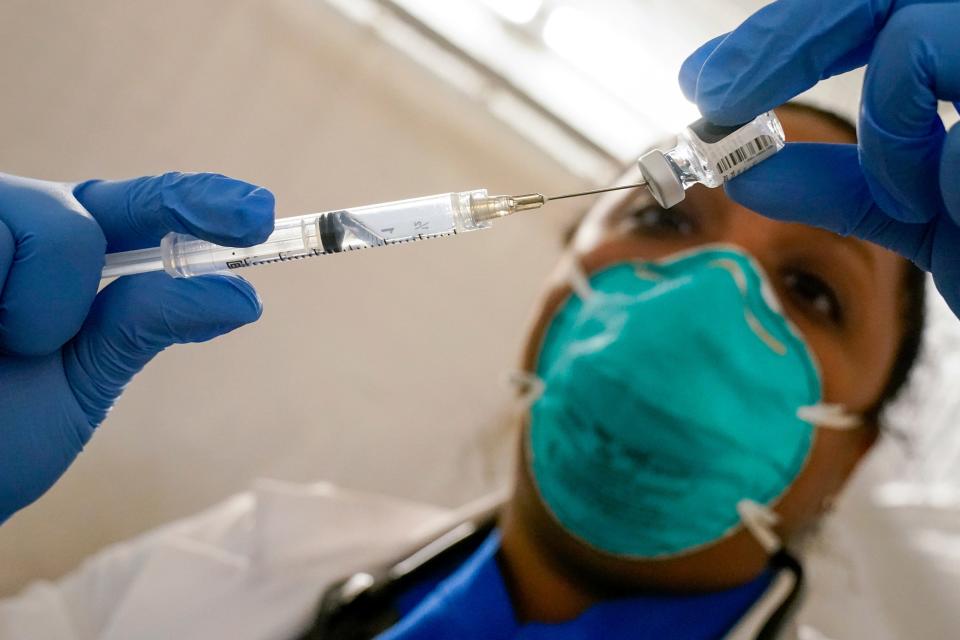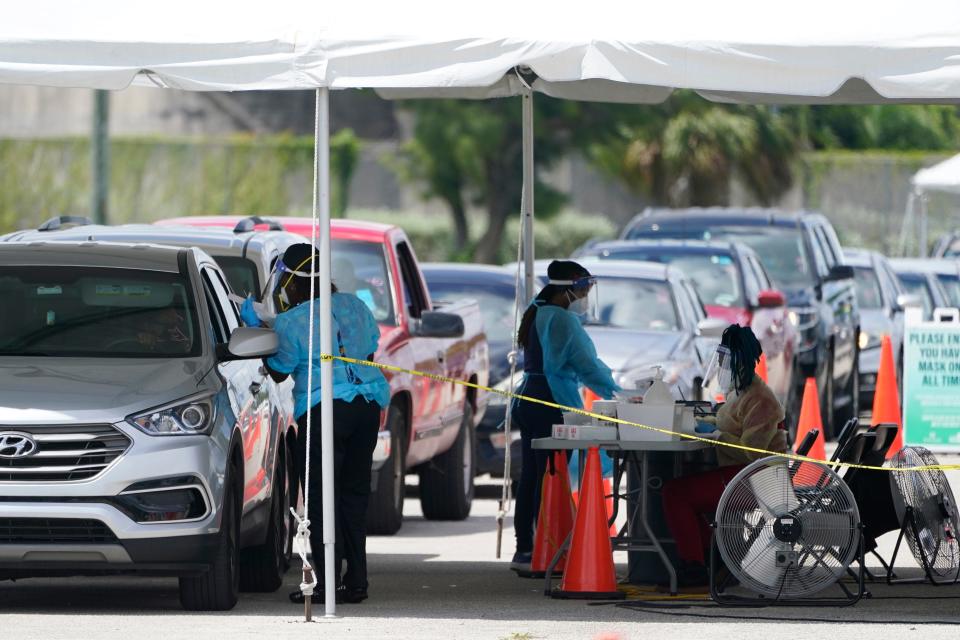White House push for COVID-19 vaccine booster shots may be premature, experts warn
- Oops!Something went wrong.Please try again later.
The Biden administration has promised that come Sept. 20, anyone who wants a third dose of COVID-19 vaccine will be able to get one, as long as they are at least eight months past their second shot.
But pulling that off may be challenging, and experts have raised questions about whether it's a good idea at all.
Anthony Fauci, Biden's chief medical adviser, told CBS' "Face the Nation" on Sunday that booster shots for Americans who received Moderna's two-dose vaccine may not be ready by that date.
"We were hoping that we would get ... both products, Moderna and Pfizer, rolled out by the week of the 20th. It is conceivable that we will only have one of them out, but the other will likely follow soon thereafter," Fauci told CBS.
In announcing the move last month, Biden said he wanted to give time for the health care system to prepare to deliver third shots to as many of the 175 million fully vaccinated Americans as wanted them.
The government has purchased enough vaccine to provide the doses free of charge to the public, the administration said.
People with weakened immune systems, who probably didn't get protection from their first two doses, have been allowed to get a third shot since mid-August.
Data from the U.S. and elsewhere suggests protection from the first two shots may be waning and the best way to boost immunity is with a third shot about eight months after the first two, Centers for Disease Control and Prevention Director Rochelle Walensky said in a statement last month.
Some experts said the administration has gotten ahead of the science, which shows that although protection against any infection does start to fade, the vaccines are extremely good at doing what they were designed to do: keeping people out of the hospital and the morgue.
"The question is: When does that (waning immunity) rise to the level of needing a booster dose?" asked Dr. Jesse Goodman, co-chair of a group of vaccine experts that has been weighing in regularly during the pandemic. "Is that urgent, or what time do we have for the data to come in?"
Goodman and other members of COVAT, or the COVID-19 Vaccine Analysis Team, said on a call with reporters last week that they were concerned the administration is moving too fast and not thinking strategically enough about how to combat COVID-19.
There is little data supporting the need for third shots for everyone at precisely eight months, they said, or even that a repeat dose of the same vaccine necessarily makes the most sense. The majority of studies end at six months, and research into formulations targeting specific variants hasn't been completed, they noted.
Plus, they criticized the administration for putting a date-certain on the time when boosters should become available – before two advisory committees had met to discuss the booster data.
"I don't see if we wait another week or two or three to gather the right data that we wouldn't have a more evidence-based data set," said COVAT co-chair John Grabenstein.
It's impossible to have all the data you'd want to make decisions during a pandemic, but decisions need to be deliberate.
"You're going to have to go with imperfect data," Goodman said, "but at least you've had the discussion and I think that's what was missing here."
The administration, in announcing that third shots would soon be available, circumvented the usual process of deciding who should get vaccines when.
Advisory committees to both the Food and Drug Administration and the CDC sign off on vaccines before they become publicly available, a process the administration said it would respect.

Even some in the administration are reportedly concerned. The New York Times reported late last week that Walensky and acting FDA commissioner Dr. Janet Woodcock told White House officials booster plans may need to be scaled back as data is gathered.
As Fauci suggested, it's possible that only the Pfizer-BioNTech vaccine will be available for third doses as of Sept. 20.
"Looks like Pfizer has their data in, likely would meet the deadline. We hope that Moderna would also be able to do it so we could do it simultaneously, but if not, we'll do it sequentially," Fauci said Sunday. "So the bottom line is very likely at least part of the plan will be implemented but ultimately the entire plan will be."
Fauci said Sunday that officials are conducting "mix and match" studies to determine whether people can use the Pfizer-BioNTech and Moderna boosters interchangeably because the vaccines use similar technologies. But for now he said it's recommended "if you got Pfizer, you will then boost with Pfizer. If you get Moderna, you'll be boosting with Moderna."
On Wednesday, the FDA announced it would hold a meeting of its Vaccines and Related Biological Products Advisory Committee on Sept. 17 to discuss third shots, but only with the Pfizer-BioNTech vaccine, called Comirnaty, not the other two authorized vaccines.
Nearly 95 million Americans are fully vaccinated with the Pfizer-BioNTech vaccine, 66 million with Moderna's vaccine and 14 million with Johnson & Johnson's. Only the Pfizer-BioNTech vaccine has received full FDA approval for people 16 and older, while Moderna's and J&J's are authorized for emergency use in adults.
In a call with reporters Friday, Moderna summarized data suggesting that the immunity provided by its vaccine starts to wane after about six months and that a half-dose of its initial shot would be enough to provide an immunity boost against COVID-19.
On Wednesday, Moderna submitted data necessary for the FDA to consider its request to deliver third shots. It's not clear whether the FDA's advisory committee will amend its agenda to include Moderna.

"The process for authorizing or approving the use of a booster dose of a COVID-19 vaccine involves each vaccine manufacturer submitting data pertaining to safety and effectiveness to the agency to support this use," Dr. Peter Marks, director of the FDA’s Center for Biologics Research and Evaluation, said in a statement Wednesday announcing the meeting. "Should the data received from other manufacturers raise unique questions that would benefit from the committee’s input, the agency intends to consider additional public discussions."
People who got the single-dose J&J vaccine would not be eligible for a second dose under the administration's plans, but because the vaccine wasn't authorized until Feb. 27, they wouldn't reach their eligibility until the end of October at the earliest anyway.
Last month, in a statement, Walensky said that she expects J&J recipients also will need boosters but that the government was awaiting more data. "With those data in hand, we will keep the public informed with a timely plan for J&J booster shots as well," she said.
The government has been too reactive and not proactive enough in combating COVID-19, said Dr. Luciana Borio, a COVAT member and partner at Arch Venture Partners and former FDA acting chief scientist.
"It's hard while you're fighting a war to also be planning ahead, but I think this is the kind of war where you need to do that," Goodman said. "You really want government and nongovernmental advice before you finalize these decisions, not after."
Logistical questions remain, too. The government has said it would not be holding large federally supported vaccine clinics as it did when vaccines were first rolled out. That will leave people reliant largely on neighborhood drug stores and community health centers.
CVS said it was ready to provide extra doses whatever the FDA decides.
"As we await further guidance and approval from regulatory agencies, we’re fully prepared to play a leading role in providing booster shots this fall," according to a company statement. "We’ve administered more than 30 million COVID-19 vaccines across the country, and immediately began offering third doses to immunocompromised individuals when authorized to do so."
The company encourages people eligible for a third dose to schedule an appointment at CVS.com to ensure that they get their shot at a pharmacy that offers the same type of vaccine they received initially.
"Patients are asked to attest that all information provided, including health status, is truthful and accurate while scheduling a vaccination appointment on CVS.com and when they receive their vaccination," the statement continued. "We reserve the right to cancel appointments if it’s determined that information provided for establishing eligibility is not truthful."
Walgreens is also "prepared and ready to administer boosters following further guidance" from regulatory agencies, according to a spokesperson.
The government has not contracted with pharmacies to deliver third shots at long-term care facilities, as it did for rounds one and two. But Walgreens is working with federal officials on vaccination planning for additional shots, the company said. Eligible patients will be able to come to pharmacies for their shots.
A COVID-19 vaccine can be safely administered at the same visit as a flu shot, according to the CDC.
Contact Karen Weintraub at kweintraub@usatoday.com.
Health and patient safety coverage at USA TODAY is made possible in part by a grant from the Masimo Foundation for Ethics, Innovation and Competition in Healthcare. The Masimo Foundation does not provide editorial input.
This article originally appeared on USA TODAY: COVID vaccine booster shots: Biden's push maybe premature, experts say
